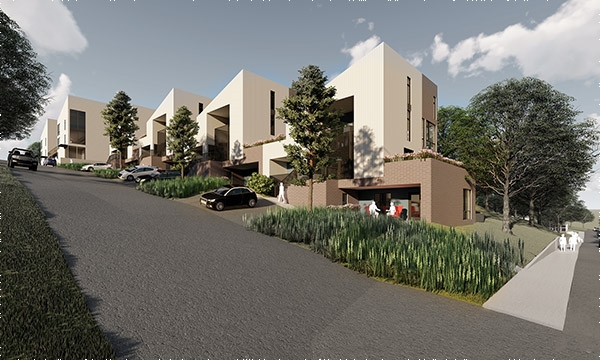
FAYETTEVILLE, Ark. – The University of Arkansas Community Design Center, working with the U of A Resiliency Center, has been awarded the 2018 Unique Contribution to Planning Award from the Arkansas Chapter of the American Planning Association.
The winning study, "Livability Improvement Plan for Willow Heights Housing," offers three scenarios for revitalizing a Fayetteville public housing complex, thereby keeping residents within walking distance of downtown.
The plan proposes development of a blended-income neighborhood through rehabilitation of existing units and construction of additional market-rate and subsidized units. This positions the city to profitably manage its assets while creating a healthy neighborhood through social return on investment, said Steve Luoni, director of the Community Design Center.
"What all three scenarios are trying to do is rebuild the neighborhood logic through renovation of existing housing, which connects better with other housing units and with the site," Luoni said. "Hopefully, we can create a neighborhood where you don't sense compartmentalization between incomes, where everyone lives at the same level."
Luoni is also a Distinguished Professor and the Steven L. Anderson Chair in Architecture and Urban Studies at the university. The Community Design Center is an outreach program of the Fay Jones School.
The U of A Resiliency Center, an interdisciplinary sustainability initiative hosted by the Fay Jones School, worked with the Community Design Center to address storm water management for the site. The hillside development, built in the 1970s, has been prone to increased flooding and erosion with recent extreme weather events.
"We recommended a series of channel and embayment systems, above ground and below ground, to reduce the flow of water leaving the site," said Marty Matlock, executive director of the Resiliency Center and a professor in the Department of Biological and Agricultural Engineering in the College of Engineering at the university. "The site actually becomes an amenity to its downstream neighbors."
The Willow Heights plan was commissioned by the Endeavor Foundation, a local organization working to improve quality of life for Northwest Arkansas residents, as an alternative to the Fayetteville Housing Authority's plan to sell the Willow Heights complex to a private developer. That would have resulted in relocating the low-income residents to another complex farther from the downtown area.
Melissa Terry, a Fayetteville Housing Authority board member and a public policy degree candidate at the U of A, received the Citizen Planner Award from the Arkansas APA for her role in developing the Willow Heights Plan and her advocacy for affordable housing areawide through planning and policy support.
Contacts
Bettina M. Lehovec, communications writer
Fay Jones School of Architecture and Design
479-575-4704,
Michelle Parks, director of communications
Fay Jones School of Architecture and Design
479-575-4704,